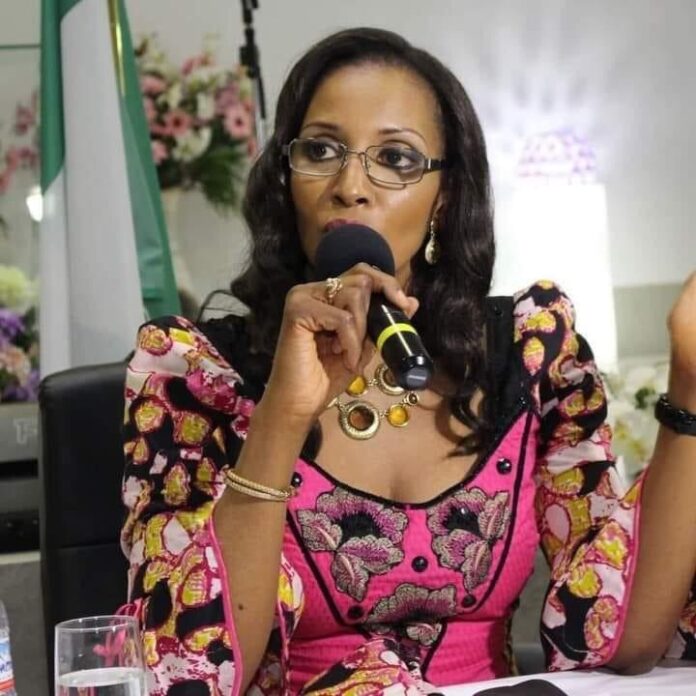Former Nigerian ambassador and widow of the late Biafran leader, Dim Chukwuemeka Odumegwu-Ojukwu, Bianca Odumegwu-Ojukwu, has appealed for calm and restraint following the conviction and life sentencing of Mazi Nnamdi Kanu on terrorism charges. Ojukwu made the remarks in a statement issued on Friday after returning from an official monitoring assignment in Zanzibar, Tanzania.
Kanu, leader of the Indigenous People of Biafra (IPOB), was sentenced earlier in the week after a prolonged legal battle with the Federal Government. His trial has drawn national and international attention due to the political, ethnic, and security implications surrounding the South-East region. The verdict has since generated tension among his supporters and sparked discussions across the country about justice, fairness, and national unity.
Bianca Ojukwu, a respected voice in Igbo affairs, acknowledged that the judgment was not what many people hoped or prayed for. However, she stressed that the moment calls for calmness rather than anger, warning that any rash action could worsen an already sensitive situation.
“There comes a time in the history of a people when there is need for calm. I therefore advise Ndigbo, and Nigerians as a whole, that such a period is now,” she wrote. “All actions which could be deemed incendiary, and which might escalate the situation at home or in the diaspora should be curtailed.”
Ojukwu urged supporters of Kanu and other concerned Nigerians to avoid protests or activities that might lead to violence. She reminded them that confrontation and threats would not help the region or the country. According to her, emotions are understandably high, but reactions must be driven by wisdom and caution.
She warned that beating “the drums of fury” or engaging in “sabre rattling” would only lead to negative consequences. The South-East, she said, has already faced significant setbacks in recent years due to insecurity, agitation, economic disruptions, and strained relations with federal authorities.
“The worst-case scenario,” she cautioned, “could be yet another wasteland,” referring to the potential for further destruction and loss if tensions escalate into violence.
Bianca Ojukwu highlighted that the best way forward is constructive dialogue among leaders of the South-East. She called for a united and sincere approach involving governors, senators, members of the House of Representatives, traditional rulers, clergy, political leaders, and the business community.
She stressed that only a coordinated and collective engagement with the Federal Government can produce a long-term solution to the crisis surrounding Kanu and the agitation for self-determination in the region.
According to Ojukwu, “This situation requires careful reflection and constructive dialogue involving all Igbo stakeholders… to engage with government authorities collectively.”
Her message highlights the long-standing demand among many Igbo leaders for a political rather than purely judicial resolution to the matter. Over the years, groups and leaders from the region have called for negotiations, amnesty, or reconciliation efforts that would address the underlying grievances fueling separatist sentiments.
Nnamdi Kanu has been at the centre of the self-determination struggle in the South-East for nearly a decade. Through IPOB, he championed calls for a referendum on Biafra’s independence, gaining a massive following among young people disillusioned with perceived marginalization of the region.
The Federal Government designated IPOB as a terrorist organization in 2017, a decision still debated by many Nigerians. Kanu’s arrest and extradition from Kenya in 2021 marked the beginning of a tense period for the South-East, with several protests, sit-at-home orders, and violent attacks linked to insecurity in the region.
Efforts by groups such as Ohanaeze Ndigbo, traditional rulers, and lawmakers to secure Kanu’s release have so far been unsuccessful. His sentencing has now intensified calls for a political approach to end the prolonged crisis.
Despite the tense atmosphere, Ojukwu’s statement carried a message of hope. She reassured Nigerians, foreign observers, and especially Ndigbo that there are still possibilities for resolving the matter peacefully and responsibly.
“I would like to reassure Ndigbo, Nigerians and our foreign partners that there are still prospects of resolving this impasse in a manner that reduces national anxiety and societal trauma,” she wrote.
She explained that she has been involved in discussions with various stakeholders over the years and believes that a united and coordinated effort by leaders of the South-East can still achieve a positive outcome.
“Now is the time for us all in Ala Igbo to put all hands-on deck,” she stated, calling for a genuine regional engagement involving all five South-Eastern states to seek a political solution.

